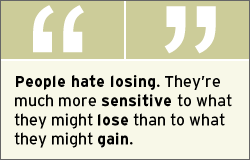Daniel Kahneman has started a quiet little revolution -- one that may wind up blasting a big hole in the foundation of economics. For centuries, economists have based most of their theories on the "rational-agent model," which assumes that people make reasonable decisions and do simple cost/benefit analyses on the things they buy. But they don't. Dr. Kahneman's research shows that, probably more often than not, individual decisions are based on perception, context, and faulty reasoning -- all of which can be manipulated.
 |
Interestingly, Dr. Kahneman is not an economist. He's a psychologist -- Eugene Higgins Professor of Psychology at Princeton University; a professor of public affairs at the Woodrow Wilson School; and a Gallup senior scientist, one of a cadre of leading scientists who lend their expertise to Gallup research.
But Kahneman belongs to an even more rarefied group: In October 2002, The Royal Swedish Academy of Sciences awarded him the Nobel Prize in economics "for having integrated insights from psychological research into economic science, especially concerning human judgment and decision-making under uncertainty." (See "The Bank of Sweden Prize in Economic Sciences in Memory of Alfred Nobel 2002" in See Also.)
Kahneman's insights are as relevant to the global economic scale as they are to the average shampoo purchase. What we think we know about our own decisions is wrong, and what we thought we knew about economics may be just as wrong. And anyone who hopes to create revenue for an organization will do well to learn from what Kahneman has discovered.
In the first of a two-part GMJ interview, Dr. Kahneman discusses how businesspeople should make high-level decisions, when and how people fall prey to cognitive illusions, and why everything always depends on context.
GMJ: A lot of your research has centered on the way people think, and you've identified two broad categories: intuition and reasoning. What's the difference?
Dr. Kahneman: Intuitive thoughts are those that come to you quickly and effortlessly, whereas reasoning is something that you've got to work at and is characteristically effortful and slower. Everyone does both -- thinks intuitively and reasons. But usually we're guided by and operate at the intuitive level. We don't slow ourselves down to reason carefully most of the time.
GMJ: Is that true for every facet of life, from decisions about what we're going to have for supper to which car should we buy?
Kahneman: Well, that's tricky. We use intuitive thinking more often than we realize, but which car to buy is a much more complicated operation. In such a case, you have intuitive wishes, and you have an initial emotional response. Buying a car is never a purely intuitive, spontaneous, impulsive thing; you reason about the car. But the reasoning is superimposed on an emotional attitude.
GMJ: How often is that first system of thinking, intuitive thinking, wrong?
Kahneman: It's fine most of the time. You know, we're very highly skilled in what we do. Whenever you develop a skill, it becomes part of that intuitive system of thought. You drive your car intuitively -- you don't think about every single operation as you do it -- and we're awfully good at that. What is remarkable is that people don't check themselves. We give answers without thinking. And most of the time we're okay. But sometimes that habit of mind gets us into trouble.
GMJ: On the other hand, if you checked every decision you ever made . . .
Kahneman: . . . you couldn't possibly live. It would just slow you down too much. You know, we've got to act, and we are, in general, very skilled at what we do.
GMJ: One of the reasons that you were awarded the Nobel Prize is you showed that the rational-agent model of economics -- that people buy things based on a careful, reasoned cost/benefit analysis, not intuition or emotion -- isn't necessarily correct, right?
Kahneman: Sort of. The line of research that I've engaged in is called the study of bounded rationality. That is, people are reasonable, but their minds are limited. So it's not that people are necessarily driven by emotion -- they're driven by mental computations that are incomplete or inaccurate, and they're susceptible to what we call cognitive illusions. And that's a different thing than being driven by emotions.
GMJ: What's a cognitive illusion?
Kahneman: It's an impression that you get at the intuitive, but not necessarily emotional, level that is wrong or misleading. Cognitive illusions are difficult to shake, and often we get them because these impressions come from accessibility. Accessibility refers to impressions based on the most accessible thought or explanation. For example, an easy question is one where the answer comes easily to mind -- it's highly accessible. The answers to difficult questions are not so easily accessible.
GMJ: Are some thoughts more accessible than others?
Kahneman: Oh, yes. There are certain ideas that come to mind very easily for various reasons. If you're in a bad mood, then thoughts of bad events come easily to mind -- the world will now seem like a more dangerous place, and you'll be more pessimistic about the future. Just being in a bad mood changes the accessibility of a whole lot of other thoughts. It's harder to imagine people laughing and smiling, and it's easier to imagine wakes and funerals.
GMJ: So if you can change someone's mood . . .
Kahneman: Oh, you can change many things about their beliefs about the world.
GMJ: How easy is it to do that?
Kahneman: Very easy. I'll give you an example from an experiment. A researcher had someone lurk around a phone booth, posing as a survey researcher. Half the time, he put a quarter in the phone booth. And so half the people who used the phone found a quarter, so they got the telephone call for free. Then, when they came out, the researcher asked them to answer a survey. Among other things, he asked them how happy they were with their lives in general. People who just found a quarter in the phone booth were much likelier to say that they were much happier with their life in general these days than the people who didn't find a quarter.
So even a small event that makes you feel lucky for just a few minutes will make thoughts of happiness much more accessible. If your first thought is a negative one, you are likely to continue to have negative thoughts for a while. You also tend to think about the past in the light of your current mood.
GMJ: So not being able to find a store clerk or getting called by a cranky phone rep can have a negative effect on a customer's behavior? Decisions can be based on perception, instead of reality?
Kahneman: Sometimes, yes. I mean, people should know that if they're in a bad mood, they're going to overestimate the likelihood of failure. People also should know that they're very prone to optimistic biases in judging how likely they are to succeed in different enterprises, and so on. People are wildly optimistic very often. And certain people exaggerate the impact of almost anything that they think about.
I have a "fortune cookie maxim" that I'm very proud of: Nothing in life is quite as important as you think it is while you are thinking about it. So, nothing will ever make you as happy as you think it will. Just thinking about things can make them seem very important.
GMJ: So how should people make reasonable decisions? Especially people like CEOs, who make decisions that affect a lot of people?
Kahneman: There are better and worse ways of making decisions. Probably the worst way is to look at the decision in isolation from everything else. If you are the CEO of a company, there are many categories of decisions that you make frequently. For those, you ought to have a policy. Then just apply the policy in a fairly standard and rigorous way rather than delving into each problem separately.
 |
If you focus too much on each problem separately, you'll get very lost and make bad decisions. But when you get some distance from your problems and look at them as a category, class, or set of problems, you become more reasonable.
GMJ: So getting some context is key to avoiding errors in perception. But how do you know if your decision making isn't just an exercise in risk aversion? Or risk taking?
Kahneman: Well, there are many factors that determine whether people do or do not take risk. It is not correct to say that people avoid risks in general, because most people actually prefer some risks.
What is true about people is that they hate losing. They're much more sensitive to what they might lose than to what they might gain. So we say that people are loss-averse, not risk-averse. For example, you ask someone to toss a coin. If the coin shows tails, you lose $20. If it shows heads, you win X amount. And now I ask you, what would X have to be to make that gamble attractive to you? What people tend to say will be somewhere between $40 and $50. So people need to be compensated more than twice as much before a 50/50 gamble becomes attractive. I think that people evaluate gains and losses relative to some reference point and put more weight on the loss, not the gains.
GMJ: How do people figure out that reference point?
Kahneman: It depends on the person and the circumstances, but the anchoring effect is a characteristic error in judgment and decision making. Anchoring is a common effect when you are buying real estate. The asking price is an anchor. It's a number that sticks in your mind, and it's very difficult to get away from it. You don't think of the actual value of the house, you think of the price, then make all your decisions based on that. So recognizing that you're susceptible to anchoring is actually quite a useful thing. A lot of negotiations are about anchors.
GMJ: Speaking of which, explain to me why, when people do home remodeling, they tend to start out with a fairly reasonable budget, then more often than not they go over budget -- and quite frequently they go . . .
Kahneman: Way over budget. One reason is that the same expense begins to look smaller in the context of the larger expense. My advice to people has always been that when you're buying an expensive house, buy the furniture at the same time. The amount that you will spend on the furniture will look small relative to the cost of the house. Otherwise, if you buy the house, and then stop, and then start buying the furniture, you'll buy furniture that isn't good enough for your house. That's because you begin to feel poor. So you actually should do everything at once; I think you make better decisions in doing everything at once. I mean, spending a thousand dollars seems like a lot of money, but the difference between $15,000 and $16,000 in remodeling your kitchen -- that doesn't seem like a lot of money. So it's the same thousand dollars, but by embedding it in a larger amount, you've made it seem small.
GMJ: So context changes everything.
Kahneman: Everything.
-- Interviewed by Jennifer Robison
In part two of this interview, Daniel Kahneman will discuss his research into well-being, why some cultures never seem satisfied, and why humans can adapt to just about any situation.